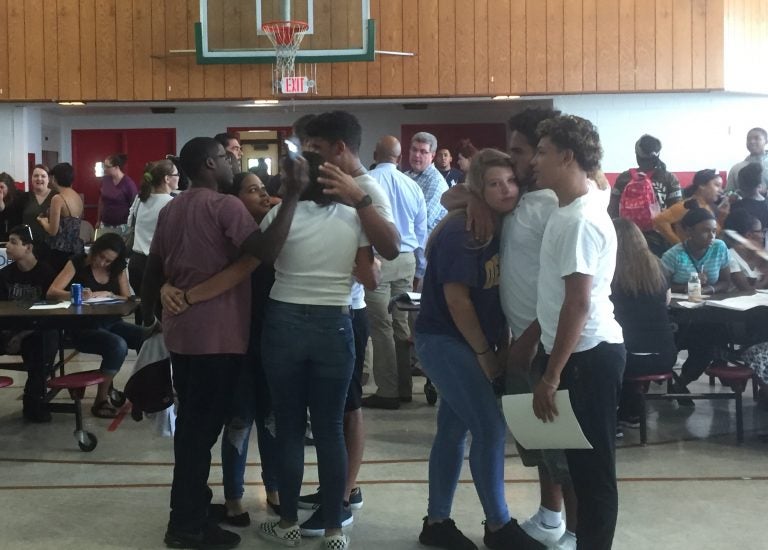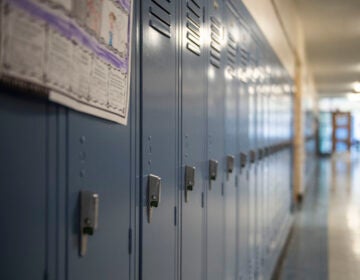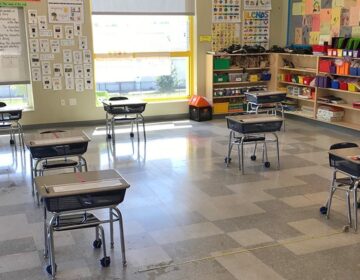Delaware charter abruptly closes, students forced to transfer
Listen 1:47
Students embrace a day after learning their charter school is closing. (Zoe Read/WHYY)
A month into the school year, upset and angry teenagers and parents filled a school auditorium in Delaware Wednesday, unsure where their academic careers would take them.
One day after the Delaware Academy for Public Safety and Security told its students they would no longer return to class, students cried and hugged their friends goodbye.
The students at the New Castle charter school were meeting with other school districts and charters in an effort to enroll in another school by the Sept. 30 deadline.
“I started with them my freshman year, and now I won’t see them at all and it sucks it has to end like this,” said senior Brianna Zayas, 18, as she fought off tears. “These teachers were our second parents, these teachers were who we asked for help when we were scared to go to our own parents.”
The academy, which was founded six years ago to prepare kids for careers in policing, firefighting and emergency medical care, was under probation from the Delaware Department of Education for academic, organizational and financial problems.
School board chair Donald Patton said while more than 200 students were enrolled, it still did not meet Department of Education standards after about 30 students just never showed up.
On top of that, the school has substantial unpaid invoices dating back to the previous year, and has a deficit of about $500,000. Patton, who joined in the spring, said the recently-reorganized board did not know of the unpaid invoices until this past week, after outside parties were brought in to audit the school.
He said in all his years in education, including 15 years as a principal, he’s never witnessed a situation like this.
“Today I feel sad,” Patton said. “It’s not a decision we wanted to make, not a decision we didn’t anguish over. In the end it was the best decision for our kids.”
He said DOE will decide how to investigate and address the unpaid invoices.
In January, DOE expressed concerns about declining enrollment numbers contributing to poor fiscal health, the fact none of the school’s 10th graders met state math proficiency standards in 2017 and only one in six were meeting standards in English, and the then-board did not have sufficient financial training.
The school was required to meet various standards in order to maintain its charter status.
In a response to the academic failures, Colonial School District agreed to provide academic, technical and professional support to prevent the state from shutting down the school.
It would have been the first time a traditional Delaware district had partnered with a struggling charter.
Colonial officials made several visits to the school to understand what it needed to improve its academics and finances, to discuss opportunities for professional development and rebuilding its infrastructure. However, the partnership never materialized.
“We were always concerned whether or not they had the financial wherewithal to be able to afford our partnership in terms of contracting services as well as looking at their infrastructure and need for support, and that has always been our concern,” said Colonial Superintendent Dusty Blakey.
“We’re disappointed this didn’t work out. This is about students, and this whole partnership was all about students and helping them follow their dreams and passions and we’re disappointed it didn’t work out.”
Patton said the school had made improvements to its academics, such as ensuring teachers were certified, as opposed to hiring subs. He thought the school was on the right path until the financial discrepancies were revealed.
Students said they knew the school had problems, but thought it was turning a corner.
“It’s like our senior experience was stripped away,” said senior Jaheim Hicks, 17. “The first month of school was great, it was flourishing, we started planning for homecoming and our pep rally, and everything we accomplished in the first month of school, and we still had eight more to go, so imagine how much stuff we could do. Now we don’t have the chance to do any of that.”
Parents say they too are devastated.
“Some kids aren’t made for public school, where they get lost in the crowd. Like my son, he’s been going here since 9th grade and he’s heartbroken, he’s made long lasting friendships,” said parent Jennifer Cain as she began to cry.
“You want your kid to graduate and now here I am struggling for an education, and education is something you take for granted and here we are fighting for our kids. My son’s highly functional autistic, the school’s done wonders for my kid and he’s losing it.”
Parent Sha-Keana McKinney, whose son is a senior, said she believed the school had addressed its issues.
“I feel like they should have never opened the school this year. To have the kids come and only start for one month and not even a complete month is sad. My son’s been in charter school for the last three years, he doesn’t want to go to a public school. I want him to be comfortable in his new school. He’s been fine here —no trouble, no incidents — he’s been okay here and he’s been doing well,” she said.
“I feel like the school board failed the students because they should have done everything they could to make sure these kids could finish this school year out and not open next year, but to leave the children hanging like this is wrong.”
Head of School Margie López Waite said the board had no alternative.
“The decision was made the minute the information was made available,” she said. “If we had known back in June, July, August the decision would have been made earlier. We made the decision as quickly as we could make it. Being in the September 30 window was really critical so the students could land in a new school and funding would follow them, and that school would be able to staff accordingly. If we would have done it any later it would have put a burden on the other schools, which wouldn’t have been fair.”
The students say they’re also concerned about being prepared to transition into other curricula.
They say the police, fire and emergency response training was held to a high standard. Firefighters visited the school, and students even had the opportunity to put out fires, for example.
However, they say they don’t believe they would be prepared if they decided to change careers to one in the humanities or sciences.
“This school didn’t prepare us enough with the education we needed, and we’re so behind in so many things and personally it scares me,” said senior Leslie Benitez, 18. “And I do want to graduate on time, because I do have plans for the future — army, I want to become a surgeon.”
Some parents and students said some schools attending the event told them they didn’t have enough of the appropriate credits to transfer there.
López Waite said because other schools don’t have a public safety career path, students must earn those credits in a different pathway.
“All of the high schools have state graduation requirements so we all have similar credit requirements. Some schools have additional credit requirements on top of that. For the most part, our students should be within the right grade based on the number of credits they’ve earned so far,” she said. “This is one of the challenges of having a unique pathway, is that some of our kids have one, two or three public safety credits, and it’s a matter of trying to align it to another career path that allows them to fulfill the career path requirement.”
St. George’s Vo Tech has an EMT pathway that would likely be comparable, but the school doesn’t have any openings, López Waite said. The only vocational school with openings is Howard High School in Wilmington, she said.
Patton said he’s concerned but hopeful.
“I think it’s going to be a very challenging transition, it’s one that I would never hope for our kids, I think our kids are great, young, wonderful people who have made some really good decisions for what they wanted to do with their future and abruptly it has come to an end for them, and I don’t think that’s easy,” he said.
“I think any time we get students, whether they’re from low performance or high performance schools, I think if we challenge them correctly and provide them with the resources, they have a higher chance of being successful.”
WHYY is your source for fact-based, in-depth journalism and information. As a nonprofit organization, we rely on financial support from readers like you. Please give today.





